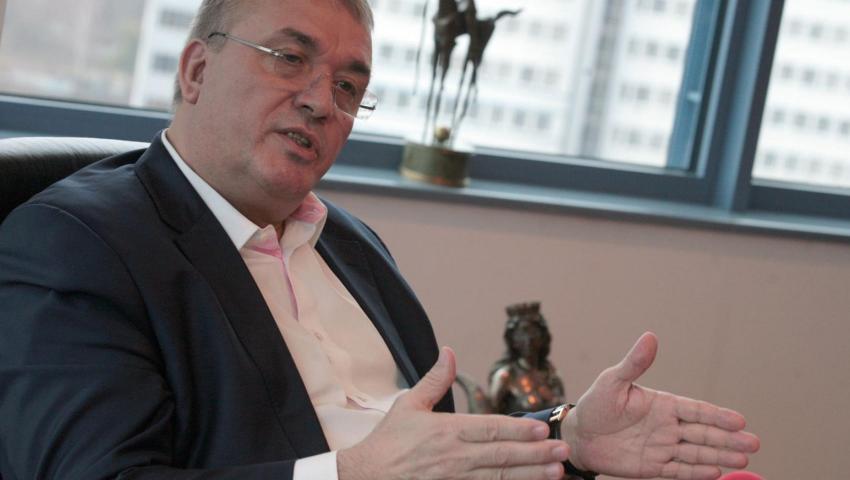If we want to move towards a zero-emission economy, according to the requirements of the Green Deal, we need four nuclear units
At the moment, there are options for continuing the Belene project, but it includes the active participation of European companies, observing the sanctions against Russia, said Bogomil Manchev, chairman of Bulatom

Source: 3eNews, archive
Mr. Manchev, why do you think the government currently thinks it is more profitable to build a new nuclear power plant on the Kozloduy site?
Bulgaria needs to build four nuclear units and two should be ready by 2030. And the next two should be ready by 2040 and the analysis of any of the first pair of reactors should be done by experts. And the political decision will be made by the political class. And if they rearrange, which follows from the economic analysis, they will bear their political responsibility. Unfortunately, it will have a very negative impact on our economy.
In no way should we confront the projects whether to build the Seventh and Eighth Units at Kozloduy NPP or the Belene project. It is more than clear that we need both sites, arranged according to their economic feasibility. And depending on which project is more advanced in terms of licensing and as a project, it should start first.
It is illogical to move the equipment from the Belene site to the Seventh Unit, as there is no logic in explaining how this equipment will work better on the Kozloduy site than for the Belene NPP. The analysis to be done by the experts will show which infrastructure is at a more advanced stage - whether that of Kozloduy or Belene.
To date, the Belene site has passed all approval procedures as a nuclear site. The parameters of this site are not compatible with the idea of Kozloduy site. In fact, at Kozloduy NPP we have a licensed site on which to be the first to build a site for a nuclear unit. They first need to license the construction site of the Eighth Block - this process has not yet begun. No analyzes have been made for the geotectonics under the future site of the Eighth Block and there is no report on the impact on the environment.
I pay attention to all these things, because the procedure for the creation of nuclear energy facilities must be done in accordance with the Energy Charter, which Bulgaria has signed with the European Community.
Due to the situation between the Russia-Ukraine conflict and the sanctions imposed on Moscow, it should be clear that we have delivered equipment and a technical project for the Belene NPP, which is practically ready and presented to the Nuclear Regulatory Agency. Now, however, it cannot be said that Bulgaria has an EPC contractor (EPC is an abbreviation of Engineering Procurement Construction (contract for design, construction and commissioning) and without it it is not possible to build an energy facility, ed. Note). This is also the biggest problem that remains to be solved.
Sanctions are currently in place against Russian companies, and EPC's contractor is Atomstroyexport. This is the big problem for this equipment and this project. If we start making a new project again, choosing a new technology, then politicians should be aware that it takes at least 15 years.
According to the rules of the European Community, only nuclear facilities can be built on a licensed NPP site, but not others. In order to build something else on the Belene site, its license must be revoked.
So far, I see that the only strong positive event so far is the statement of Deputy Prime Minister Asen Vassilev that we will build a nuclear power plant. This is a political statement in the direction of the fact that our country will develop nuclear energy and the political class has not given up on its development. And how to do it is a matter of decision of the experts and after their analysis the actions will be in the hands of the government.
But the site must be Bulgarian property?
Yes, the site must be owned by the Bulgarian Energy Holding, ie 100% state-owned. Thus, BEH and the Ministry of Energy can strategically develop the energy sector. That is why it is important that the backbone of the system - the base energy - is managed by the state, because if private plants start making extra profits, they cannot be managed by the state. Respectively, the people and the business in Bulgaria cannot be supported. Otherwise it will be possible.
I recently listened to Finance Minister Assen Vassilev, according to whom we will build nuclear power, because Greece would take 20% of the plant. We also have a proposal from Serbia for 10% participation, and 5% from Macedonia. But we need to clarify for ourselves - these countries will be an offtaker (long-term buyer of electricity), will be an investor or will be the owner.
Isn't the idea to be offtakers?
Offtakers are people who buy certain amounts of electricity for a long time, but the price of energy is determined each year depending on the stock market price.
Or they will be an investor (owner). These countries must then sign all conventions on the owner of a nuclear facility. And Greece has a decision in its parliament not to participate as a shareholder in nuclear power plants, no matter where the project is located. So they will probably be offensive. If the countries want to be financial investors and will finance the project, they will want to receive quantities of energy at a fixed price. This is a problem because it is a type of PPA (purchase power agreement) that is banned by the EC.
